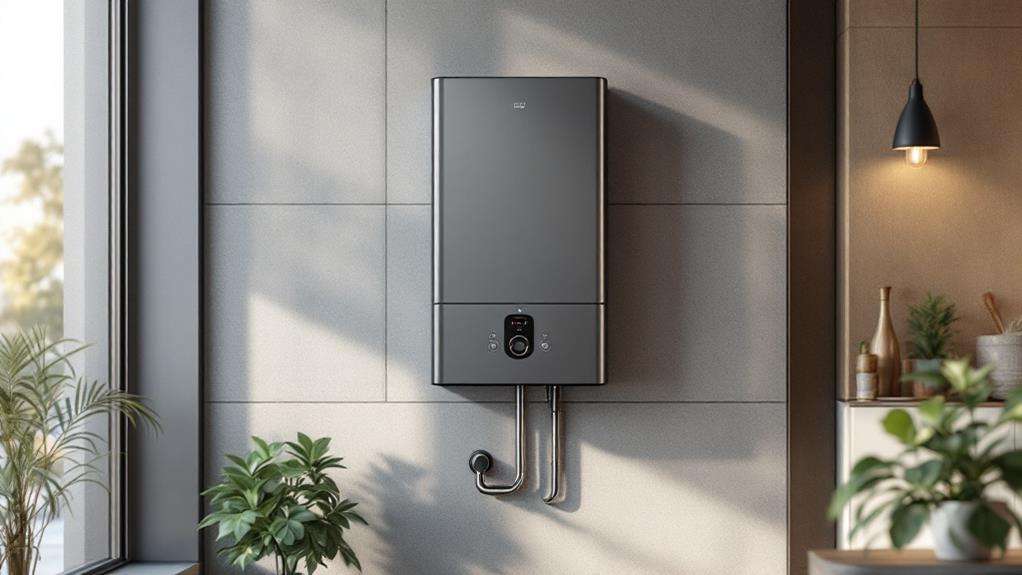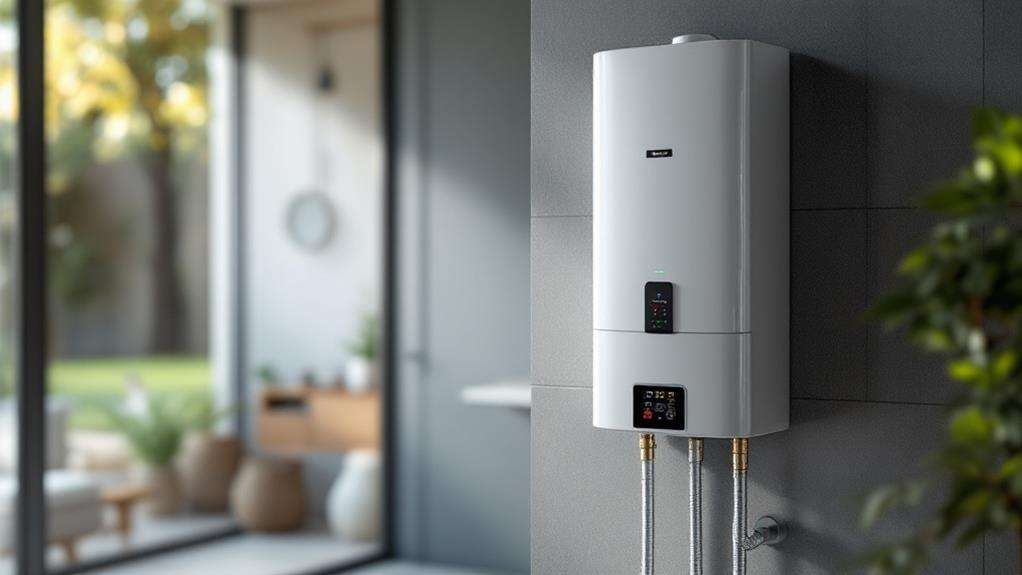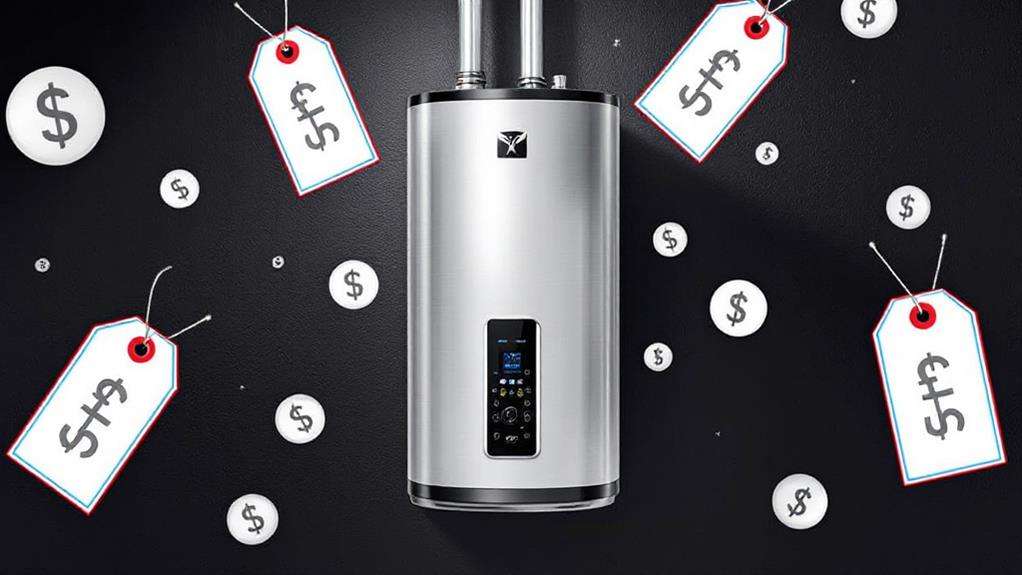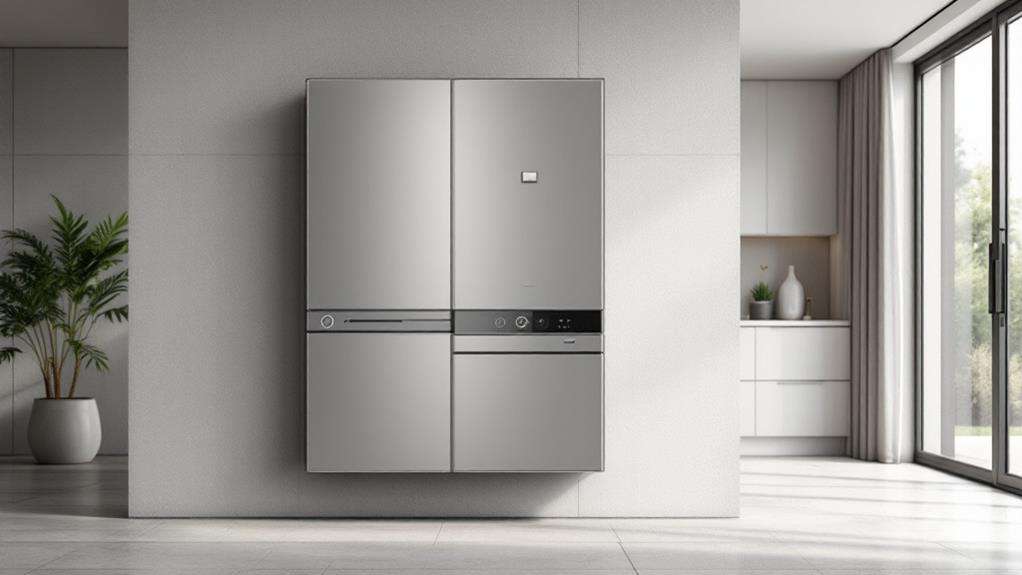Pros and Cons of Hybrid Water Heaters for Home Use
As a homeowner, you'll find hybrid water heaters offer significant energy savings, up to 60% off your utility bills. They use a heat pump to efficiently heat water, reducing your carbon footprint. Plus, they provide a consistent supply of hot water without running out. While the upfront cost may be higher than traditional models, the long-term savings and rebates can make them a smart investment. However, they do require a bit more maintenance. Learn more about whether a hybrid water heater is the right choice to meet your household's hot water needs.
Key Takeaways
- Hybrid water heaters are highly energy-efficient, reducing water heating costs by up to 60% compared to standard models.
- They provide a consistent and reliable hot water supply through a combination of heat pump and backup heating technology.
- Compact and flexible installation options make them suitable for a wide range of ambient temperatures and living spaces.
- Hybrid systems significantly reduce greenhouse gas emissions, contributing to a smaller carbon footprint.
- Periodic maintenance, including refrigerant checks and component servicing, may be required to ensure optimal performance.
Energy Efficiency and Cost Savings
The hybrid water heater is a remarkably energy-efficient option for your home. It's the perfect choice if you're looking to slash your utility bills and reduce your environmental impact. By combining the best features of traditional storage tanks and modern heat pump technology, hybrid models deliver impressive energy savings. Compared to standard electric or gas-fired heaters, they can slash your water heating costs by up to 60%. That means a significant reduction in your monthly utility bills, allowing you to keep more money in your pocket. And with their enhanced efficiency, hybrid water heaters also have a smaller carbon footprint, making them a more eco-friendly solution for your home. What's more, many utility companies offer rebates and incentives for upgrading to a hybrid system, further boosting the financial benefits. So if you're ready to enjoy the convenience of hot water while being kind to the planet and your wallet, a hybrid water heater is the smart choice.
Consistent Hot Water Supply
Another key benefit of hybrid water heaters is their ability to provide a consistent supply of hot water. Unlike traditional water heaters, hybrid models use a combination of an electric heat pump and a backup heating element to maintain a steady temperature. This reliability of operation means you'll never have to worry about running out of hot water, even during periods of high demand. The temperature consistency is also a major advantage, as hybrid water heaters can maintain a preset temperature without fluctuations. This ensures you always have water at the perfect warmth, whether you're taking a shower, doing the dishes, or running a load of laundry. With their advanced technology and efficient design, hybrid water heaters are a great choice for homeowners who value a dependable and consistent hot water supply.
Compact and Flexible Installation

A key advantage of hybrid water heaters is their compact and flexible installation. Unlike traditional tank-based water heaters, these hybrid models are designed to take up minimal space, allowing you to easily fit them into tight areas or even closets. Their zoned installation options mean you can position the heat pump and storage tank separately, tailoring the system to your home's layout and needs.
This flexibility extends to the climate control aspect as well. Hybrid water heaters can be customized to operate efficiently in a wide range of ambient temperatures, ensuring optimal performance no matter where you live. Their advanced technology allows them to adapt to your home's unique heating and cooling requirements, providing reliable hot water while minimizing energy consumption.
Whether you're remodeling or building a new home, the compact and adaptable nature of hybrid water heaters makes them an attractive choice, giving you the hot water you need without sacrificing valuable living space.
Reduced Greenhouse Gas Emissions
Hybrid water heaters offer a remarkable environmental advantage - they significantly reduce greenhouse gas emissions compared to traditional tank-based models. By utilizing a combination of electricity and heat pump technology, these innovative appliances are able to slash your carbon footprint and minimize your home's environmental impact.
- Hybrid water heaters are up to 3 times more energy-efficient than standard electric or gas-fired units, translating to a significant reduction in your energy consumption and associated greenhouse gas emissions.
- The heat pump technology employed in hybrid models allows them to draw heat from the surrounding air, reducing the need for energy-intensive heating elements and further enhancing their eco-friendly performance.
- Many hybrid water heaters are designed to integrate seamlessly with renewable energy sources, such as solar panels, further amplifying their carbon footprint reduction capabilities.
- Compared to traditional tank-based water heaters, hybrid models require less energy to maintain the desired water temperature, resulting in even greater environmental benefits over the long term.
Hybrid Technology Advantages

The key advantages of hybrid water heater technology lie in its exceptional efficiency and versatility. These advanced systems leverage both electric and heat pump technologies to deliver impressive reductions in energy consumption. You'll enjoy improved performance and lower utility bills compared to traditional electric or gas-powered water heaters.
The heat pump component of a hybrid water heater draws heat from the surrounding air, then transfers that heat to the water, making it an incredibly efficient way to heat your home's water supply. This process requires significantly less electricity than standard electric water heaters, translating to meaningful savings on your monthly energy costs.
Additionally, hybrid water heaters offer flexible installation options, allowing you to select the ideal placement within your home to optimize performance and efficiency. This versatility ensures you can find the perfect solution to meet your household's hot water needs, all while shrinking your carbon footprint and utility expenses.
Potential Maintenance Requirements
While hybrid water heaters offer impressive efficiency and installation flexibility, you'll also need to consider their potential maintenance requirements. Unlike traditional tank-style water heaters, these hybrid models have additional components that may require regular upkeep.
- Seasonal maintenance: Depending on your climate, you may need to adjust the system's settings to accommodate changes in temperature and humidity. This could involve cleaning the air filter or adjusting the heat pump's operation.
- Professional servicing: Hybrid water heaters often require more specialized maintenance than their conventional counterparts. Engaging a qualified technician for annual or bi-annual inspections can help ensure your system operates at peak efficiency and catch any potential issues early.
- Refrigerant checks: The heat pump in a hybrid water heater relies on refrigerant to transfer heat. Periodic checks and refills may be necessary to maintain optimal performance.
- Pump and compressor care: These moving parts require regular monitoring and, in some cases, eventual replacement to keep your hybrid water heater functioning reliably.
Initial Purchase Cost Considerations

When considering a hybrid water heater for your home, the initial purchase cost is an important factor to weigh. These units typically cost more than traditional water heaters, with prices ranging from $1,000 to $3,000 or more, depending on the unit size and features. However, the higher upfront cost can be offset by energy savings and available rebates.
Many utilities and local governments offer rebates or tax credits for installing energy-efficient hybrid water heaters. These incentives can significantly reduce the initial investment, making the cost more comparable to a standard water heater. Additionally, the long-term energy savings from the hybrid technology can help recoup the higher upfront price over time through lower monthly utility bills.
When budgeting for a hybrid water heater, be sure to research any applicable rebates or incentives in your area. This can help you determine the true cost of the unit and make an informed decision about whether the investment is worthwhile for your home.
Noise Level and Placement
One key consideration when selecting a hybrid water heater is the noise level and placement within your home. Hybrid water heaters, while efficient, can produce more noise than traditional units due to their compressor and fan components. This is an important factor to weigh, as the placement of your water heater can impact both the sound levels and accessibility for maintenance.
- Noise levels can vary between models, so be sure to research the decibel rating and any vibration concerns before purchasing. Placing the unit in a utility closet or basement can help mitigate noise concerns.
- Accessibility is also crucial for your hybrid water heater's location. Choose a spot with ample clearance around the unit for easy access during routine maintenance and potential repairs.
- Consider the piping requirements and ensure the placement allows for proper venting and drainage.
- Discuss your home's layout and needs with the installer to find the optimal location that balances noise, accessibility, and functionality.
Lifespan and Warranty Coverage

In addition to noise levels and placement, the lifespan and warranty coverage are important factors to consider when selecting a hybrid water heater. Hybrid water heaters are known for their longevity expectations, often lasting 10-15 years with proper maintenance. This is longer than traditional tank-style heaters, making them a worthwhile investment for your home.
When it comes to warranty coverage, you'll want to carefully review the manufacturer's offerings. Many hybrid water heater brands provide generous 10-year or even lifetime warranties on the compressor and tank. This gives you peace of mind knowing your investment is protected. However, be sure to understand any limitations or exclusions in the warranty terms.
Considering the lifespan and warranty coverage can help you choose a hybrid water heater that will reliably and efficiently meet your hot water needs for years to come. With the right model, you can enjoy the benefits of this technology without worrying about premature failure or costly repairs.
Suitability for Different Home Sizes
Hybrid water heaters come in a range of sizes to accommodate different home needs. When choosing a hybrid model, it's important to consider the size of your home and your household's hot water demands. Smaller units are well-suited for apartments and small homes, while larger models can handle the needs of larger properties.
- If you have a small home or live alone, a compact 40-50 gallon hybrid water heater should suffice. These models take up minimal space and tend to be quieter in operation.
- Families in medium-sized homes will likely need a 50-80 gallon hybrid water heater to meet their hot water requirements. These mid-sized units balance performance and space considerations.
- Homeowners with large houses or high hot water usage may require an 80-100 gallon hybrid model. These powerful units provide ample hot water but have greater space requirements and may be louder.
- Noise considerations and space needs should factor into your decision. Hybrid water heaters are generally quieter than traditional tanks, but larger models may produce more operation noise.
